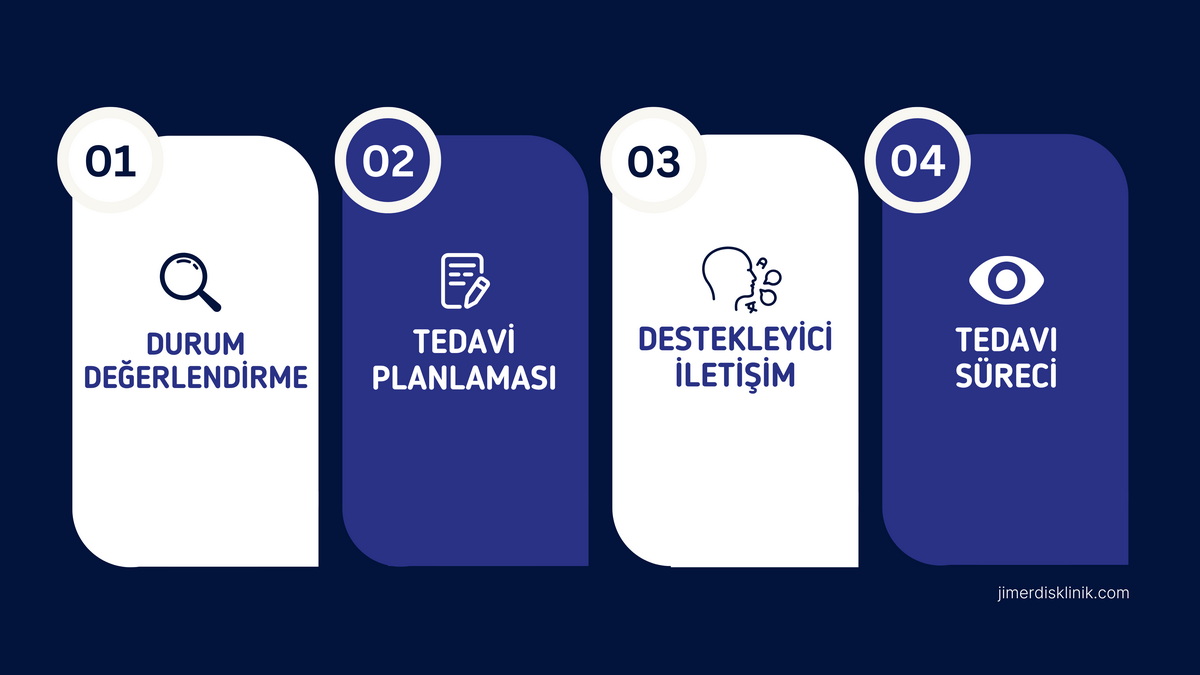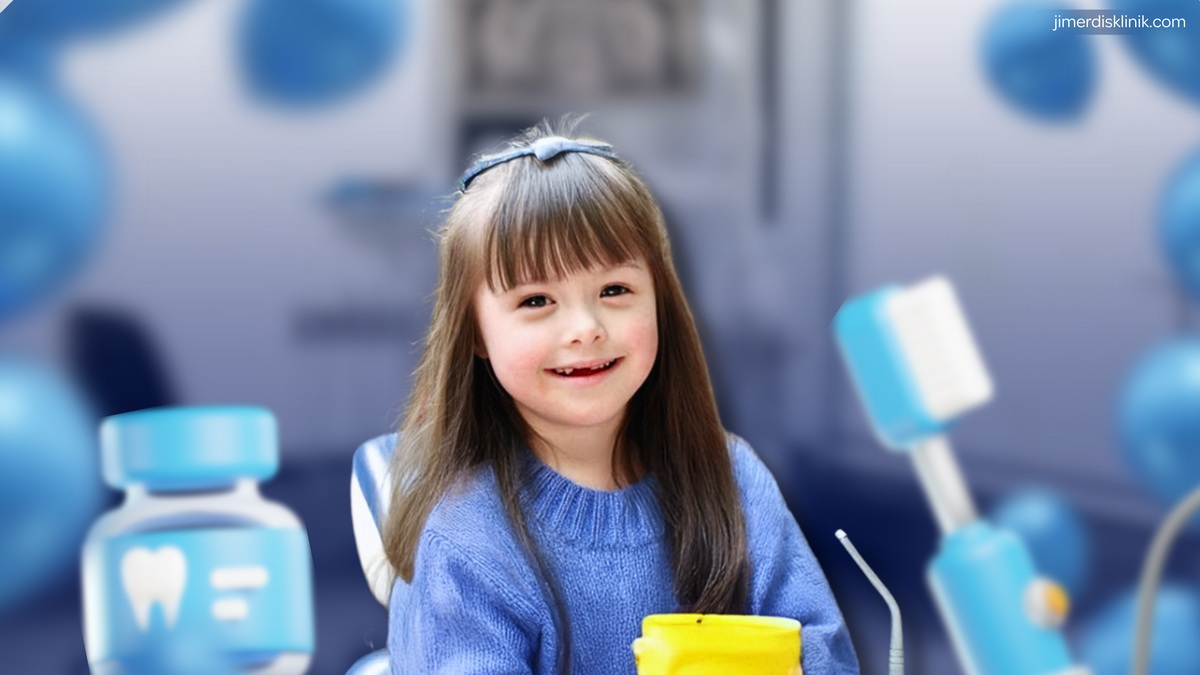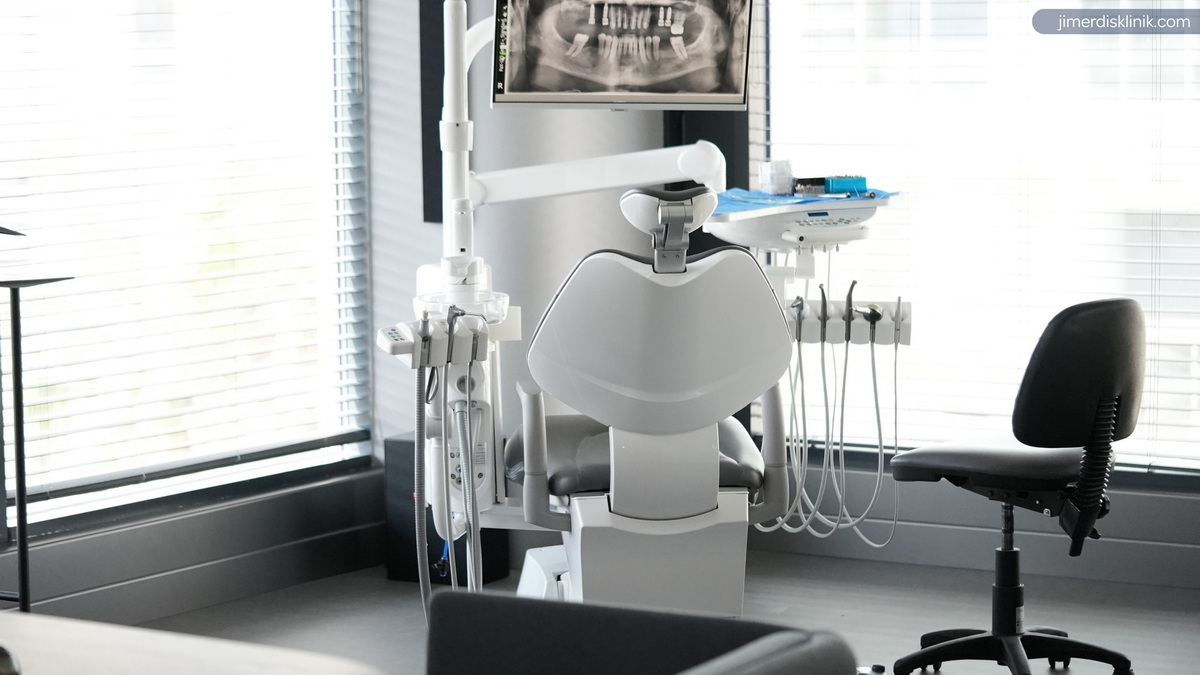Dental Treatment for Disabled Individuals
Oral and dental health is an important issue that directly affects the quality of life of individuals with physical and mental disabilities. Individuals with special needs may have difficulty establishing a regular oral hygiene routine, maintaining healthy eating habits, and expressing oral and dental health concerns.
Neglected oral and dental problems can lead to physical ailments such as pain, infection, and loss of chewing function, as well as psychosocial problems such as low self-confidence and difficulties in social interaction. Furthermore, impaired chewing function can lead to inadequate nutritional intake and related systemic health problems. Therefore, the oral and dental health of individuals with disabilities should be as prioritized as their general health needs; regular checkups, preventative measures, and necessary treatments should not be neglected.
Research shows that tooth and gum disease is 20-25% more common in individuals with disabilities than in healthy individuals. Therefore, access to oral and dental health services for individuals with special needs should be increased, ensuring they receive the maximum benefit from these services. The right of individuals with special needs to receive high-quality oral and dental health services, just like every individual, should be considered a fundamental human right.

-
Negative Conditions Affecting Dental Health in Individuals with Disabilities

Many factors negatively impact the oral and dental health of individuals with disabilities:
Mouth and Teeth Structure: In some individuals with disabilities, genetic factors and past high-grade illnesses can weaken tooth enamel, making them more susceptible to cavities. Consequently, conditions such as missing teeth, deformities, and crooked teeth are more common. These conditions hinder effective oral care and negatively impact gum health.
Movement Limitations: In some individuals with disabilities, conditions that affect muscle control (such as difficulty controlling the tongue and cheek muscles, malocclusion, mouth breathing, etc.) not only make daily oral care, such as brushing and flossing, more difficult, but also lead to a decrease in saliva production, hindering the protective effect of saliva.
Eating Habits: Individuals with chewing and swallowing difficulties often consume soft and sticky foods. These foods adhere easily to the tooth surface, paving the way for cavities. Additionally, individuals who consume fluids without the help of others cannot benefit from the cleansing effect of water because they cannot drink enough.
Regularly Used Medications: Some acidic substances in regularly used medications can remain in the mouth for extended periods and have adverse effects. Medications used by children, especially syrups, can accelerate tooth decay due to their sugar content. Some sedatives can reduce saliva production as a side effect and cause dry mouth, which can negatively affect teeth and gum health. Any medications a person takes regularly should be disclosed to the dentist during the checkup. Early prevention with preventive dentistry can significantly prevent potential oral health problems.
-
What are the Stages of Dental Treatment for Individuals with Disabilities?

Assessing General Health Status
The first stage of dental treatment for individuals with disabilities is the preliminary assessment examination with the dentist. In preparation for dental treatment, the patient's detailed medical history is reviewed, a panoramic oral X-ray, and in some cases, a dental CT scan is taken, and the dentist comprehensively assesses the patient's oral and dental health. This allows the dentist to develop a safe treatment plan tailored to the individual's specific needs, taking into account the individual's general health.
Determining the Level of Communication for Individuals with Special Needs
Dental treatment for individuals with disabilities should be planned with particular care, taking into account the type and degree of their physical and mental disability. Adopting a patient, understanding, and personalized approach is crucial in this process. Our specialist dentists communicate effectively with the patient and their family, tailoring their needs to their needs, and utilize supportive methods such as detailed information, visuals, and models to make the process more understandable.
In dental treatment for individuals with disabilities, having experienced specialist dentists conduct the process effectively is crucial for a successful treatment outcome and for establishing a sense of confidence in the patient.
At Jimer Dental Clinics we offer a comprehensive range of dental treatments for individuals and children with disabilities, with our expert dentists boasting over 15 years of experience. Our fully equipped clinic for people with disabilities offers personalized treatment plans. When necessary, we also offer integrated supplementary treatment and supportive healthcare services in collaboration with Nilüfer Jimer Private Hospital.
Collaboration with Patients' Relatives and Doctor's Approval
In dental treatment for individuals with disabilities, a specialist dentist and the patient's family collaborate. The dentist may request certain information about the patient from the family before treatment. In some cases, the dentist may need to obtain a consultation report or approval from the patient's own doctor before the dentist can perform the treatment.
Personalized Treatment Planning
Because the needs of each individual and child with disabilities are unique, an approach and treatment plan tailored to their mental and physical sensitivities, rather than standard practices and approaches, is essential. The specialist dentist plans a long-term treatment and care process, taking into account oral hygiene, diet, medication use, and past dental treatments. Personalized planning makes the treatment process easier for both the family and the patient, while minimizing the risk of potential complications. Ultimately, the dental treatments and preventative measures implemented contribute to the patient's sustainable oral and dental health.
Required Consent and Information Process Before Treatment
Before treatment begins, the patient with a disability and their family member are provided detailed information by the dentist, along with the specialist, regarding the treatment, all procedures, and potential complications. The patient or family member then signs the necessary consent forms.
-
What are the Dental Treatment Methods for Individuals with Disabilities?
Depending on the patient's degree of disability, two types of treatment are recommended by the dentist:
- Local Anesthesia: This is preferred for individuals with disabilities who can communicate verbally and cooperate with the dentist.
- General Anesthesia (Sleep): For individuals with significant disabilities who are unable to adapt to chairside treatment, general anesthesia is preferred for safe and effective treatment. It is a highly reliable method because it is performed under the supervision of a general anesthesiologist and their team in a fully equipped hospital operating room.
-
How is Dental Treatment Applied in Children with Disabilities?

Dental Treatment for Children with Special Needs and Autism
A pediatric dentist (pedodontist) is a specialist dentist who specializes in the dental health of children and has received specialized training in this field. Pedodontists are individuals who, following a general dentistry education, have five years of dental training and specialized training in child care, including dental development, treatment of childhood oral and dental problems, child behavior management, and growth and development monitoring. Pediatric dentists provide children with a child-specific approach to dental treatment.
A careful and empathetic approach, particularly in the treatment of children with special needs and mental and physical disabilities, and considering each child's individual differences, is crucial. A pediatric dentist takes these needs into account and conducts the treatment process in a safe and comfortable environment.
For children with heightened sensory sensitivity, such as those with autism, the appropriateness of the treatment environment, proper doctor-patient communication, and personalized planning of the methods used are crucial. Our specialist pediatric dentist at our clinic is experienced in this field and utilizes specialized communication techniques in the treatment of children with autism. As a dental clinic for children with autism in Bursa, we also provide dental treatment for children.
For families seeking a pediatric dentist in Bursa, Jimer Dental Clinics provides a fully equipped treatment environment for children with autism and individuals with special needs. We offer reliable, highly communicative service tailored to their treatment needs.
-
Bursa Pediatric Dentistry for Disabled Children

Our clinic and hospital in Nilüfer, Bursa, has a specially designed children's dental clinic to ensure our children feel comfortable and secure. Our specially designed children's dental clinic, with its modern, colorful design and a variety of toys, is filled with details that engage and reassure children. Children with special needs may experience increased fear and anxiety in environments where they feel unfamiliar, which can lead to psychological stress and resistance during treatment. At our children's dental clinic for disabled children, we provide a special environment to minimize these negative emotions and facilitate their adaptation to treatment with a personalized approach.
-
In what situations is general anesthesia used?
- General anesthesia is used for individuals and children with severe physical and mental disabilities,
- Individuals who are unable to adjust to a chair (extreme fear of the dentist),
- Younger children, especially those aged 3-6, who are undergoing multiple treatments over a long period,
- Individuals with intense and uncontrolled gag reflexes,
- Patients with drug allergies or a history of allergic reactions to local anesthetics used.
-
General Anesthesia Protocol Stages for Adults and Children with Disabilities
- First Stage: Examination and Follow-up
Following a preliminary examination and radiographic evaluation by a specialist dentist and general anesthesiologist, the patient's general health is assessed. If deemed necessary, a specialist consultation and tests are requested. The treatment plan is planned by the specialist dentist so that all procedures can be completed in a single visit. - Second Stage: Treatment
Under general anesthesia, the pre-planned procedures are successfully completed in a single visit, and the patient is safely discharged after a follow-up examination the same day.
- First Stage: Examination and Follow-up
-
What Are Preventive Dental Health Practices for Children with Disabilities?
In preventive dentistry, several types of treatment are implemented to significantly prevent future dental and oral health problems in children with disabilities. Preventive treatments such as fluoride applications and fissure sealants are applied to prevent food stuck in cavities from causing tooth decay and tooth loss. In addition to these applications, caries preventive (protective) fillings can also be applied to patients who respond to in-chair treatment.
-
How Often Should Individuals with Disabilities Have Dental Checkups?
It is important for patients to visit the dentist regularly after treatment to ensure long-lasting results. Preventive treatments play a significant role in maintaining oral and dental health. Assistive devices that enable individuals with disabilities to maintain better oral hygiene at home can help support sustainability.
-
Disability-Friendly Private Dental Clinic – Accessible Healthcare for Everyone

The right of individuals with special needs to access healthcare services equally, comfortably, and safely is a fundamental right. Our disability-friendly private dental clinic, located in Nilüfer, Bursa, is specifically designed to provide individuals with disabilities and children with comfortable and safe access to oral and dental health services. Our level and wide entrances, doors, accessible elevators, and specially designed restrooms and sinks for individuals with disabilities support accessibility, allowing us to provide equal healthcare services to everyone.
At Jimer Dental Clinics, we prioritize effective communication with our expert team, ensuring that everyone receives an equitable and safe treatment process.
If you are looking for a safe and accessible dental clinic for your loved one with disabilities, please contact Jimer Dental Clinics for more information and to schedule an appointment.
Dental treatment for individuals with disabilities should be carefully planned, taking into account the individual's disability, medical history, communication style, and special needs. An accessible clinic environment provides significant convenience for both patients and their families.
Like everyone else, individuals with intellectual or physical disabilities can safely receive dental treatment. However, planning should be made considering the individual's specific needs, ensuring a comfortable and safe dental treatment experience for the patient.
During the treatment process, general anesthesia, local anesthesia, or sedation may be administered, depending on the patient's condition. The patient is comfortably asleep during the procedure, and the treatment is complete when they wake up. For patients who do not respond to in-chair treatment, general anesthesia, administered in a fully equipped operating room in the hospital under the supervision of an anesthesiologist, is the safest treatment method.
If the specialist dentist anticipates that the patient will experience a physically or mentally challenging time in the chair during the treatment, they recommend general anesthesia. Bursa general anesthesia dental treatment is performed on individuals with disabilities. During the surgery, the anesthesiologist continuously monitors the patient's heart rate, rhythm, blood pressure, and respiration. Because Bursa general anesthesia dental treatment is performed in a hospital environment for individuals with disabilities, all potential complications are under control, and the patient receives support from cardiology and internal medicine departments beforehand to prevent any potential complications. All procedures are completed under general anesthesia in a single session, and the patient is discharged without needing to return for treatment. Completion of the treatment in a single visit and in a hospital environment ensures a high level of safety for individuals with disabilities. Post-operative pain is controlled with painkillers.
A dental hospital for people with disabilities, a Bursa dental clinic, should be easily accessible and comfortable, even for wheelchair users. They should receive treatment from a specialist who understands their specific needs and adopts a compassionate and patient approach. Jimer Dental Clinics is one of Bursa's leading accessible dental clinics, boasting a suitable infrastructure and experienced dental staff for individuals with disabilities.
Our patients can benefit from the services we offer, including access to disability-friendly clinics, general anesthesia treatment in a hospital setting, a dedicated healthcare professional approach, personalized planning for routine checkups and appointments, equal access to healthcare services, and discounted treatment for individuals with disabilities and their families.
At our clinic and hospital, individuals with disabilities can receive sensitive and meticulous dental treatment tailored to their needs and health.
When our patients with disabilities experience dental fear, our expert dentists instill confidence by engaging in friendly communication with the patient and their family, and carefully manage the treatment process to ensure the physical and psychological comfort necessary for their well-being.
Due to their susceptibility to dental disease, it is generally recommended that individuals with disabilities visit a specialist dentist every three months as a precaution.
We first plan dental treatment for children with autism with our specialist pediatric dentist. Our specialist pediatric dentist plans the entire autism spectrum disorder dental treatment process in Bursa with family members, considering the child's sensory, psychological, and physical state, considering their development, and communicating in a way that reassures children. Treatment for these children with special needs is provided at our Bursa Nilüfer Parkora pediatric dental clinic or Jimer Hospital.
Our specialist pediatric dentist (Pedodontist) administers dental treatment to children with autism and neurodevelopmental disorders under local anesthesia for those who are compatible with the chair treatment, and under general anesthesia for children with autism who have physical or psychological difficulties with the chair treatment.
Our specialist pediatric dentist schedules routine checkups based on the child's dental and oral health and development. The frequency of visits may vary depending on the child's oral and oral health and general condition.
There are various public and private centers in Bursa that offer dental treatment for children with autism, Down syndrome, and other neurodevelopmental disorders. It is recommended that these children receive a careful and sensitive evaluation and treatment by a specialist pediatric dentist. Jimer Parkora Children's Dental Clinic offers comprehensive, personalized dental treatment for all these children.
For all children with disabilities and those with disabilities, you can contact our expert team at our pediatric dental clinic to schedule an appointment and learn more about treatment options.
In Bursa, dental clinics for people with disabilities are available at some public oral and dental health centers and private dental clinics. These clinics provide comfortable dental care for both adults and children. Our clinics and hospitals also offer dental clinics for people with disabilities.
SGK covers dental treatment if the person has a disability report, but this is not the case in private institutions.
TSS and SGK insurance coverage do not cover dental treatments performed at private dental clinics.
The government does not cover dental treatment for people with disabilities in private dental clinics.
We offer discounted treatment prices to patients who apply to our clinic with a disability ID.
There is a dental examination fee for individuals with disabilities and children.
For adults and children with disabilities, dental treatment is not provided free of charge in private dental clinics and hospitals.
Dental implants for people with disabilities can be performed free of charge at public health institutions, excluding the cost of the implant itself. All treatments, including dental implants, are provided for a fee at private dental clinics.
Families should prepare for the treatment process by gathering information about their medical history, regularly used medications, and, in some cases, obtaining approval from the dentist if requested by the dentist. All this information, along with the patient's specific condition, should be explained to the dentist in detail and should be helpful during the planning phase.
You can contact our expert team at +90 533 738 14 52 to get detailed information and schedule your appointment.
At Bursa Private Jimer Hospital, we perform dental treatments under general anesthesia and provide this service in a fully equipped operating room.
Take advantage of our Dental Treatment for Disabled Individuals service now!
Complete the form to receive complimentary 5 star hotel, spa services, breakfast, and vip transfer.
Our Specialists

Spc. Dt. Ece Baysan
Pedodontics (Child Dentistry) Specialist
Dt. Ömer Demirçak
Dentist
 TR
TR DE
DE